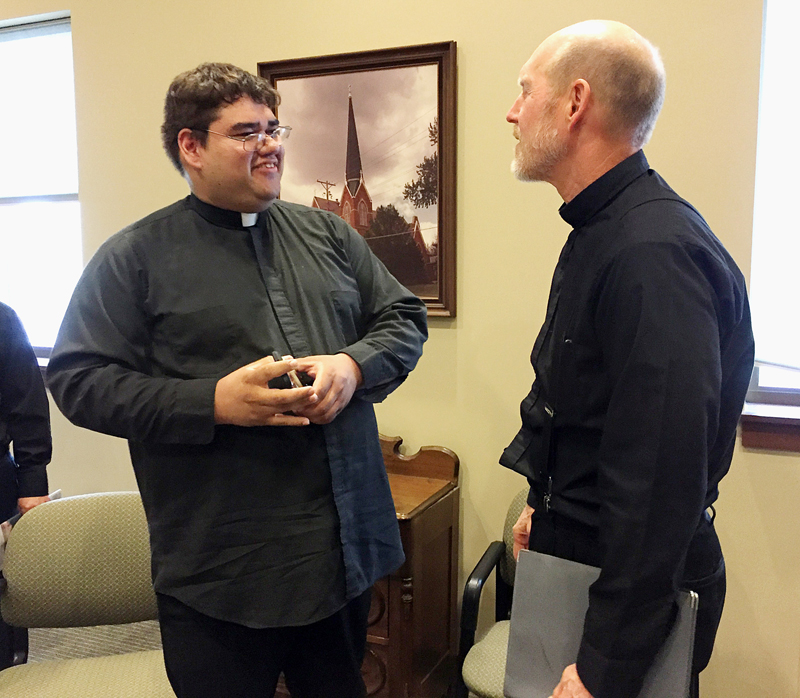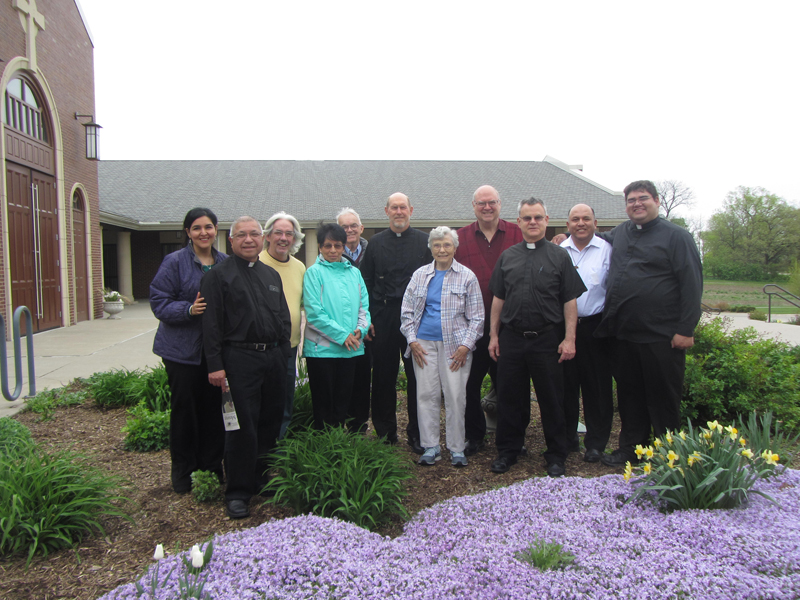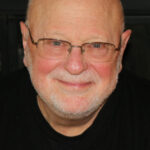
Father Guillermo Trevino talks with Bishop-elect Thomas Zinkula during a break at a meeting with Hispanic ministers in Iowa City April 26.
By Barb Arland-Fye
The Catholic Messenger
IOWA CITY — Bishop-elect Thomas Zinkula made a point of participating in the April 26 meeting of clergy, women religious and laity who minister to Hispanic Catholics — two months before he assumes leadership of the Diocese of Davenport.
Miguel Moreno, the diocese’s coordinator of Multicultural Ministry, extended the invitation after the April 19 announcement and introduction of Bishop-elect Zinkula at a diocesan staff meeting. In response to a couple of questions, the future bishop said he doesn’t speak Spanish and hasn’t worked extensively with Hispanic populations. But he’s open to doing that. He will be ordained the ninth bishop of the Diocese of Davenport on June 22.
“It doesn’t matter if you speak the language; it’s whether people perceive that you care about them,” Father Rudolph Juarez told the bishop-elect at the Iowa City meeting of Pastoral Agents in Hispanic Ministry. Fr. Juarez is pastor of St. Patrick Parish, which hosted the Pastoral Agents’ meeting. He also serves as Vicar for Hispanics.
“I was very happy that he was at the Pastoral Agents’ meeting,” said Father Bernie Weir, pastor of St. James Parish in Washington. “He took time to support our ministry before he’s even officially in the diocese. I was very impressed and energized by the fact that he was there.”
“He has a very good sense of humor. I think he’s a man of God and I think he has an open mind and an open heart,” said Father Guillermo Trevino, who serves St. Mary and St. Alphonsus parishes in Davenport and St. Peter Parish in Buffalo. “To meet with Hispanics this early, as a bishop-elect, shows me a lot, as a priest…. I should also have an open heart and an open mind,” Fr. Trevino said.
Among the topics discussed at the Pastoral Agents’ meeting:
Multicultural parishes: Father Jim Betzen, C.PP.S, pastor of St. Mary of the Visitation Parish-Ottumwa, noted that Ottumwa has become home to a number of people from African countries, the Philippines and Spanish-speaking countries. Bishop-elect Zinkula said that the multicultural diversity reminded him of Postville, Iowa, which is in the Archdiocese of Dubuque, his home diocese.
“Our church is becoming very multicultural,” observed Sister Irene Munoz, CHM, who serves as Multicultural Minister for the Ottumwa area. Her work, primarily, is with Spanish-speaking Catholics. “I think we’re adding a lot of richness to the church and vitality and hope.”
Fr. Weir said the majority of his Spanish-speaking parishioners at St. James-Washington are from Mexico. Several indigenous languages are spoken in the parish, which is the first language for some Catholics. Approximately 150 to 200 people attend the 11:30 a.m. Spanish Mass on Sundays. He is aware of a group of about 45 Guatemalans who may be attending other churches in the area. One of the community churches uses buses to transport Hispanics from various communities to church services in Washington. “We’re going to try to invite them back to the Catholic Church and help them to feel welcome at the Spanish Mass,” Fr. Weir said.

Bishop-elect Thomas Zinkula met with Hispanic ministers from across the diocese April 26 in Iowa City. Ministers from left: Ana Maria Shambaugh, Father Rudolph Juarez, Father Bernie Weir, Sister Irene Munoz, CHM; Father Dennis Martin, Bishop-elect Zinkula, Sister Jane McCarthy, OSF; Father Jim Betzen, C.PP.S.; Father Greg Steckel, Miguel Moreno and Father Guillermo Trevino.
He also celebrates Mass once a month in Mount Pleasant for a small community of Spanish-speaking Catholics. “We’re trying to make sure they know the liturgy is available. We’re not sure they know that because it’s once a month in the middle of the month.” Signs are being posted near businesses, Laundromats, trailer parks and elsewhere to get the word out. Some Spanish-speaking Catholics are also praying the rosary together in their homes and inviting others to join them.
Sister Jane McCarthy, OSF, said attendance at Prince of Peace-Clinton’s Spanish Mass has been picking up slightly, following a decline. She also noted that two bilingual mothers of students in faith formation have been helping parents with translation when they need to communicate with the director.
Fr. Trevino said attendance at the Spanish Mass at St. Mary Parish-Davenport is growing. About one-half of the attendees are from the Illinois Quad-City area. Some people have expressed fear of being deported. “I blessed a family last week that is going to Canada as refugees,” he said.
Seminarians: Bishop-elect Zinkula asked whether diocesan seminarians are required to learn Spanish. Seminarians do have Spanish in an academic setting and, if possible, participate in a Spanish-immersion experience. Two Hispanic seminarians for the Diocese of Davenport are studying for the priesthood at Immaculate Conception Seminary College in Missouri.
Immigration office:
Bishop-elect Zinkula asked how the Davenport Diocese is helping people in the diocese with immigration documentation. The diocese has an immigration office at diocesan headquarters in Davenport. Iowa City immigration lawyer, Dan Vondra, also works with immigrants.
Spanish permanent diaconate:
Several Spanish-speaking men were ordained permanent deacons about 35 years ago. Bishop Gerald O’Keefe was committed to bringing that ministry to the Davenport Diocese. At the time many migrant workers were living in the area, Sr. Munoz said. “We needed to be able to minister to them in many ways in the church or even outside the church and to be a presence. And so that’s what we did back then. The deacons that were ordained did their work.”
Moreno noted that a new initiative for a Spanish permanent diaconate program is still in process.
Spanish MFP:
Participation in the Ministry Formation Program (MFP), which is growing significantly, is a prerequisite for the permanent diaconate program. Nearly 130 Spanish-speaking Catholics planned to attend the MFP class in Davenport on April 29. Fr. Juarez praised the efforts of the Multicultural Ministry staff — Moreno and Ana Maria Shambaugh — for the dramatic upturn. Fr. Weir said: “It’s important to have well-formed, well-trained laity for our parish ministries.”











